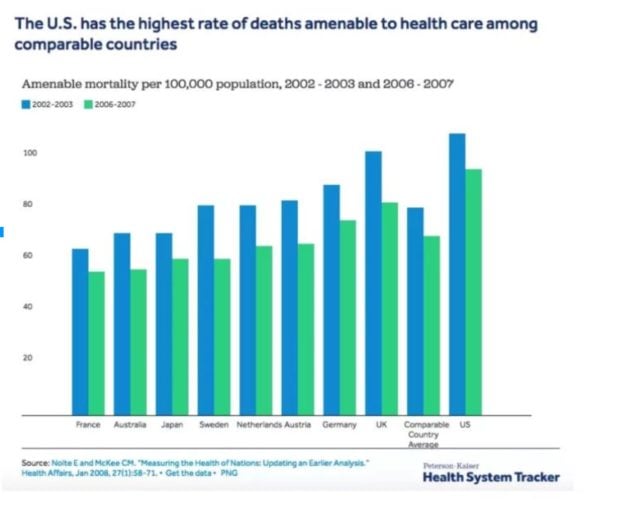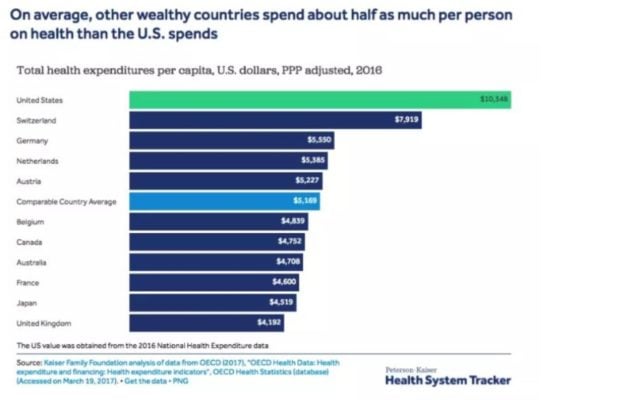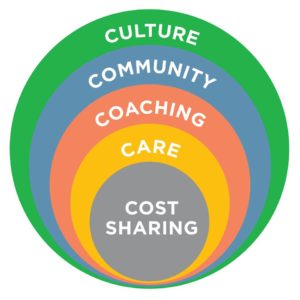Sharing is caring!
Once you explore the principles behind functional medicine, it becomes very clear that health insurance today is really a prepaid drug plan. It’s time to create something new!
For those of us seeking more holistic and natural ways to heal, we know that the current state of “health care” is pretty damn sick. Despite all of our modern advances, one in every two people today has a chronic illness, according to the Centers for Disease and Prevention (CDC). And then there are the skyrocketing costs involved, which come with diminishing returns.
“People are sicker than ever — which means that medicine isn’t working to address the root cause of chronic disease,” says James Maskell, creator of the Functional Forum, the world’s largest integrative medicine conference. He is also the mastermind behind Knew Health, a passion project aiming to turn the insurance industry and health care upside right. He and a robust group of functional medicine practitioners are creating a community-based alternative to health insurance that is affordable and focuses on getting people well and keeping them that way.
Paying To Stay Sick
Health care costs are higher than ever — with 86 percent of healthcare costs coming from lifestyle-driven chronic disease, according to the Center for Disease Control and Prevention. People can barely afford their insurance premiums, and even that coverage leaves many without the quality of care they need to get well – and stay well.
And according to a recent Harris poll, only seven percent of people actually trust their health insurance company, which only adds to the anxiety around coverage, cost, and care.
“Conventional health insurance is essentially a prepaid drug plan, ” Maskell recently told a crowd in Los Angeles, after ending a 26 city big bus tour across 18,000 miles. “If you are the kind of person that values proactive approaches to maintaining and creating health, you might be overpaying for services you are unlikely to use.”
Trump reportedly said recently that providing universal health insurance doesn’t work anywhere in the world. He avoided calling the policy Medicare for All — likely because 60 percent of the American public favors the idea. Instead, he referred to it as “socialist” health care. As a Canadian who grew up in a socialist system, I am sad to see that “socialism” has become a dirty word.
According to The Organization for Economic Co-operation and Development (OECD)’s 2018 statistics on health, in 2017, the average consumer spend in the United States is expected to have risen above $10,000 for the first time with health being the biggest item of final household consumption.
Look below at these two graphs:

 While it is true that “countries that prioritize universal coverage by relying on the government to provide health care (as with single-payer) have better health outcomes while spending less than the U.S,” writes ThinkProgress, it is also true that all developed countries, independent of the payment system, are struggling with the weight, and associated massive costs, of lifestyle-driven chronic illness.
While it is true that “countries that prioritize universal coverage by relying on the government to provide health care (as with single-payer) have better health outcomes while spending less than the U.S,” writes ThinkProgress, it is also true that all developed countries, independent of the payment system, are struggling with the weight, and associated massive costs, of lifestyle-driven chronic illness.
“We all know that this kind of thinking can’t solve such a massive, complex problem,” says Maskell.
Which means it’s up to us, the health crusaders, the change-makers, and the ‘healthy deviants’ to forge a new system of Health Care. A system that addresses the root cause of chronic disease, while empowering individuals to take charge of their health within a culture that directly rewards and incentivizes personal responsibility and self-care.
Maskell called this a KNEW system of health care culture that focuses on creating an ecosystem committed to facilitating health for the lowest possible cost while preventing and reversing lifestyle-driven chronic illness.
He has dubbed this “The 5Cs of Health Care Transformation.”
Functional Medicine: The 5Cs of Heallth Care Transformation
 #1: Culture
#1: Culture
Culture, represented by the outer green ring of the 5C graphic, incentivizes a mindset of health and is the least expensive way to get well and stay well.
For example, those who live in cities and towns with ample outdoor exercise space, a supportive community, and access to high-quality foods tend to have healthier citizens. Likewise, families who support one another, cook healthy food together, and are active in their community and/or churches, have created their own mini-culture of health in which to thrive.
“At KNEW Health Community, the culture we are creating is based on inspiring and incentivizing healthy habits among our members within their respective communities,” explains Maskell.
They accomplish this by educating and empowering individuals to maintain their own health. They will be offering curated health education opportunities from a rich diversity of leaders in the movement, including book club masterclasses with authors, group programs for specific wellness priorities, and access to lowest-cost labs to assess focus areas proactively.
Culture creates common language and priorities, yet is still rich with diversity. This is a basis for long-term wellness, personal fulfillment, and cost-savings for all.
#2: Community
The second C, represented by the blue circle, is Community — which slightly costs more expensive than culture, says Maskell.
Many (if not most) of us weren’t fortunate to be born into a culture that incentivizes healthy behaviors, such as what we see in the Blue Zones of the world. Therefore, we must get the support we need to start cultivating that culture within our communities.
A really inspiring example of this comes from Okinawa, Japan, a Blue Zone where life expectancy for women (90 years old) is the highest in the world.
One of the contributing factors behind this success is what’s known as a “Moai”
A Moai is a group of five friends who form their own support network/community, offering each other social, logistical, emotional and even financial support for a lifetime. The Moai is a perfect living example of how a strong sense of community promotes and creates longevity and health.
Community reinforces a healthy culture, and a healthy culture is nothing without a strong community to support it.
The costs involved in being part of a community are minimal and include social expenses, like getting together for meals, helping out friends, travel, time, etc.
At KNEW Health Community, they will incentivize strong community creation through batch cooking classes, fitness groups, Meetups, local events, etc.
“We’ve said it before and I’ll say it again, community, not medicine, creates health,” says Maskell.
#3: Coaching
Next in the 5Cs is Coaching, represented by the red ring — specifically Health Coaching.
A Health Coach helps you get healthy and stay healthy, by creating awareness and offering education and goal-setting around behavioral patterns which either create or degrade your well-being.
For example, Health Coaches are highly effective in helping people better manage and overcome mild, chronic, lifestyle-driven ailments such as pre-diabetes, thyroid conditions, weight-gain, sleep problems, and stress (to name but a few). Health coaches, such as myself, are trained in functional medicine science and work with licensed practitioners.
A health coach costs more than Culture and Community, but their rates are a fraction of what you’d spend on managing a chronic condition through doctors’ visits and conventional care.
At KNEW Health Community, our members have the option to receive support from a dedicated Health Coach, should their health (or habits) start getting off-track. Because we all have moments where we fall-off-the-wagon especially if we’re not yet surrounded by a strong culture and community of health-conscious friends.
These are the perfect times to call on a Health Coach for some strategy, education, and support.
#4: Care
If you have a more severe chronic disease, or if/when something serious comes up, this is the time to seek Care from a functional medicine doctor (Care is represented by the yellow ring).
This is one of the more expensive of the 5Cs. But when utilized properly, it will wind up saving you bundles of cash.
Why? Because functional medicine doctors specialize in a root-cause resolution of chronic disease and “mystery” illnesses.
In other words: your caregivers will find out what’s causing your symptoms (which is never a lack of medication) and devise a program to address them once and for all.
These doctors aren’t in the business of “disease-management” — though they can help you with that while you get to the bottom of things; rather, their goal is to help your body heal itself so you can go backward in this cost-savings cycle from Care to Coaching to Community to Culture.
KNEW Health Community has an extensive network of highly-trained functional medicine doctors we can refer members to if a need arises.
#5: Cost Sharing
At the center of the 5Cs is Cost Sharing, which is at the core of their offering at KNEW Health Community.
All 5Cs are built into this cost-sharing model:
- A Culture which supports healthy behaviors.
- A Community which drives and reinforces that cultural standard.
- Coaching through our functional Health Coaches, for those times you need a little extra health and wellness support.
- Care through our network of functional medicine doctors who specialize in root-cause resolution.
- All this adds up to a Cost sharing experience that keeps members healthy, helps them regain their health, and helps them share those expenses should an acute or chronic issue come up.
This last point is key, says Maskell, because nearly everyone will have unexpected (or expected e.g., a birth) medical expenses come up in life.
“That’s where cost-sharing rounds out and completes the 5Cs: it’s an affordable alternative to health insurance in which we share each other’s unexpected medical expenses as they arise.
So, as a member of KNEW Health Community, you’re not in this alone — you’re part of a vast “Moai”, who will have your back as healthcare needs evolve and change.”
This system is similar to the long-standing, Christian-based cost-sharing ministries used by over a million Americans, but with greater transparency, fewer restrictions, and the common faith in the power of wellness as a lifestyle. These programs have been proven to work for decades to save members money whilst incentivizing personal and community responsibility in Health Care.
Here is some early data on the average cost-savings they’ve observed since the launch, check this out:
- Individuals in their forties save over $2600/year ($217 per month)
- Families in their thirties: over $6500/year ($542 per month)
- Couples in their fifties: over $5000/year ($417 per month)
To see how much you could save, rel=”noopener” data-saferedirecturl=”https://www.google.com/url?q=https://ji177.infusionsoft.com/app/linkClick/79340/898b8cfeb3c20a02/88551262/619e2e1a38f1468f&source=gmail&ust=1543171454521000&usg=AFQjCNEiLTAF4DSjc4JPF6eQXGlbwqzHLg”>click here to try out their cost/savings calculator for free.
THIS is how we change the trajectory of healthcare from a sick-care-incentivized system to a Health Care system powered by the 5Cs.
If this sounds like something you’re interested in being a part of, click here to learn more about founding membership in KNEW Health.
- Tags: community, functional medicine, health care

